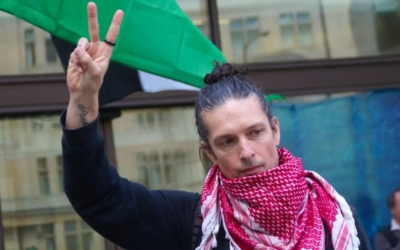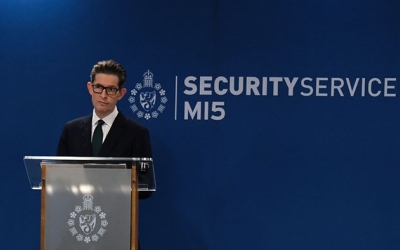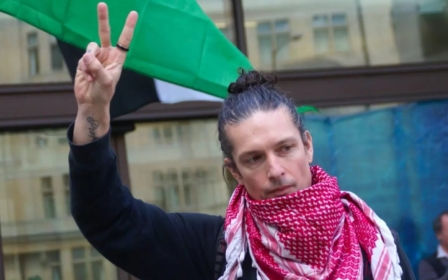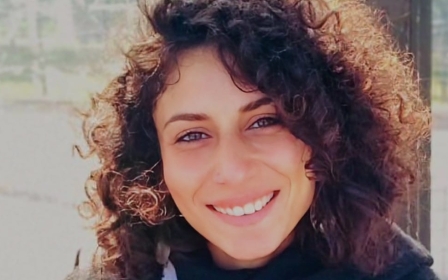In Britain, Palestine and climate activists face an 'unprecedented' wave of criminalisation

Anti-terrorism and anti-mafia laws are increasingly being used by British authorities to detain and prosecute activists and journalists, according to those affected by the legislation and the legal experts defending them.
Campaigners say there is an ongoing and unprecedented crackdown on the right to protest in the UK with those most impacted including Palestine activists and climate change protesters.
The campaign group Defend Our Juries said that since July this year, more than 40 climate and pro-Palestine activists have been imprisoned - all of them either sentenced to prison after conviction or jailed on remand awaiting trial.
In December last year, the Metropolitan police said they had made 630 arrests of Just Stop Oil activists in that month alone, a figure that civil rights group Liberty condemned as “staggering and shocking”.
The trend accelerated after Israel’s war on Gaza began in October, but activists and legal experts say it is part of a broader crackdown on civil disobedience dating back to 2022.
New MEE newsletter: Jerusalem Dispatch
Sign up to get the latest insights and analysis on Israel-Palestine, alongside Turkey Unpacked and other MEE newsletters
Michael Forst, the UN special rapporteur on environmental defenders, said the situation is the worst it has been in the UK since the 1930s.
The measures are in part driven by the global efforts of think tanks representing the interests of fossil fuel companies and the arms industry, which have helped characterise social movements as extremist and are involved in the drafting of anti-protest legislation.
'Test case'
On 17 October, counterterrorism police raided the home of Electronic Intifada journalist Asa Winstanley, confiscating his electronic devices as part of an investigation under the Terrorism Act into his social media activity.
According to Electronic Intifada, a letter from the Counter Terrorism Command cited possible offences under sections 1 and 2 of the Terrorism Act, relating to the offence of “encouragement of terrorism”, adding that the raid had been conducted as part of an operation codenamed “Operation Incessantness”.
In August, pro-Palestine journalist Sarah Wilkinson was arrested by counterterrorism police in a dawn raid on her home for allegations relating to content she had posted online.
Her arrest followed that of Richard Medhurst under section 12 of the Terrorism Act allegedly in connection with his reporting on Palestine.
According to Medhurst, he is the first journalist to be arrested under the legislation.
“I don’t know what I can and cannot say,” Medhurst said in an interview with Al Jazeera. “They’re trying out a test case. They’re trying to see how much they can get away with.”
Medhurst recently posted on X that his investigation had been extended by another three months.
In the same week, the UK-based activist group Palestine Action (PA) announced that its co-founder is facing terror-related charges, in connection with three speeches he made in the wake of the Hamas-led attack on 7 October 2023.
Richard Barnard is accused of “expressing an opinion that is supportive of a proscribed organisation contrary to section 12 of the Terrorism Act”, and facing two charges of encouraging criminal damage.
Barnard will stand trial on 14 April 2025.
According to Palestine Action, 16 of the group’s members are currently behind bars, with only five sentenced and the rest held on remand.
The "Thales Five" were convicted of "breach of the peace" and "malicious mischief" and handed custodial sentences of between 12 months and 16 months after they occupied the Thales arms factory in Glasgow in June 2022.
On 6 August, six Palestine Action members were detained for a week without charge under the Terrorism Act after they caused £1m ($1.34m) worth of damage to Israeli arms company Elbit Systems' research hub in the Filton area of Bristol. Another four members were rounded up in the following days and accused being connected with the action.
According to Palestine Action, the activists were held in solitary confinement and denied contact with their families for two weeks.
The Police and Criminal Evidence Act (1984) stipulates that detainees are permitted an initial phone call, although this right may be delayed under the Terrorism Act.
The group reported that some activists are being held under “restricted status for women”, an "additional security measure" which can be given to female prisoners "whose escape could present a risk of serious harm to the public".
'The terrorism charges are unprecedented, so it’s difficult to know what other powers they have'
- Palestine Action spokesperson
In August, counter-terrorism police re-raided one of the detainees' homes. The 10 were charged with non-terror-related offences, including aggravated burglary and criminal damage, and remain in custody.
On 13 August, the 10 were denied bail in the magistrates court.
During a preliminary hearing on 13 September, the group’s trial date was set for November 2025, above the UK’s standard pre-trial custody time limits for the crown court, which is 182 days.
Activists say the situation has left them scrambling.
“Normally, we’d know what our rights are. The terrorism charges are unprecedented, so it’s difficult to know what other powers they have,” said a spokesperson for Palestine Action.
The Terrorism Act has long been used by the police to lengthen periods of detention and for stop and search inspections, often against visibly ethnic and religious groups. However, the legislation was rarely used against defendants in activism-related offences until recently.
Under the legislation, police can detain protesters without charge for up to seven days, with the possibility of extending detention for an additional 14 days.
Police, Crime, Sentencing and Courts Bill
The policing and media scrutiny of Palestine Action escalated in the wake of 7 October. “Before then, we were completely ignored by the mainstream media,” a group spokesperson told Middle East Eye.
“But [afterwards] the media were much more interested in what we were doing, and the police became a lot more intense in their approach to us.”
The group noticed that their online training workshops were increasingly being infiltrated by right-wing media, who would then inform the police.
A report by the legal rights campaign group Network for Police Monitoring (Netpol) found that since last October the police have been influenced by “an increasingly coordinated campaign of public pressure by the media, government ministers and pro-Israeli opponents of Palestine solidarity, who demand that the police ‘do more’ to crack down on allegedly 'unacceptable protests'."
But experts and activists say the roots of the current crackdown go back at least to a couple of years earlier.
In 2022 and 2023 a raft of anti-protest legislation gave law enforcement agencies and the government a range of legal tools to stifle activists.
The Police, Crime, Sentencing and Courts Bill 2022 (PCSC) and the Public Order Act 2023 has weakened protesters’ rights, vastly expanded police powers, and enabled the Crown Prosecution Service (CPS) to bring more serious charges against them.
Such legislation came amid increasingly high-profile direct action tactics used by climate groups, such as the blocking of key roads by protesters.
“They’re trying out different things to target disruptive protests, and see what sticks in court,” Kat Hobbs, a spokesperson for Netpol, told MEE. “Whatever works, they will expand to the rest of the movement.”
The PCSC bill criminalised trespass, granted police powers to impose restrictions on protests, and created an offence of wilful obstruction of a highway.
It also made public nuisance, a common law offence rarely levelled at protest defendants, a statutory offence.
“That was a signal to the CPS to start using that charge against protesters,” Graeme Hayes, head of sociology and policy at Aston University, told MEE.
The Public Order Act further increased police authority to restrict protest, and among other measures, made an offence of “locking on”, a direct action tactic whereby protesters attach themselves to people, objects or buildings, and interfering with key infrastructure.
The government cited actions by climate groups Extinction Rebellion (XR), Just Stop Oil, and Insulate Britain as justification for the act’s introduction.
Systematic removal of defences
Alongside the legislation, the Court of Appeal has systematically removed key defences that protesters used to rely on for acquittal or to temper sentencing.
As a result, ever more draconian sentences are meted out to activists who are brought to trial.
In 2021, the Court of Appeal threw out terror-related charges for the Stansted 15, a group of activists who locked themselves to the wheels of a charter jet at Stansted airport in 2017.
However, the court simultaneously rejected the use of “necessity”, a key defence for activists prosecuted for direct action which argues that the defendants acted to prevent greater harm.
'In some environmental protest cases, judges have refused to allow protesters to mention the climate at all - how can they give evidence naturally?'
- Audrey Cherryl Mogan, solicitor
In March 2024, the court ruled that the “beliefs and motivation” of protest defendants could no longer constitute a lawful excuse for criminal damage, if the link between the action and the harm it was intended to prevent was “too remote”.
Activists could still hope for “jury nullification”, where juries acquit defendants on conscience, meaning defendants could be acquitted even where defences have been removed.
A growing trend of jury acquittals has prompted judges to limit the time that defendants have in court to discuss their motives, in order to crack down on juries repeatedly acquitting social movement actors on conscience.
On 18 July, five Just Stop Oil activists received record sentences for conspiracy to cause public nuisance as part of a plan to block traffic on the M25 in November 2022.
While public nuisance can have a reasonable excuse defence, a conspiracy charge does not, so the defendants had to rely on explaining their motives to the jury.
But the judge, Christopher Hehir, ruled that the five defendants could refer in their defences only briefly to the climate science that motivated them, which he told the jury was irrelevant to their decision.
“In some environmental protest cases, judges have refused to allow protesters to mention the climate at all," solicitor Audrey Cherryl Mogan told MEE. "How can they give evidence naturally? And in other cases, even if it doesn't go exactly to your defence, you would give a background to who you are and why you wouldn't have [committed the crime].”
'Prosecutorial activism'
The legal crackdown on protest is also being achieved by more covert means.
Legal and legislative measures being wielded against activists also serve to delegitimise campaign groups by building associations between criminality, terrorism and peaceful protest.
“There is a sense of prosecutorial activism, which is about trying to escalate charges against groups which would not normally be seen as being terrorist groups,” Aston academic Hayes told MEE.
'There is a sense of prosecutorial activism, which is about trying to escalate charges against groups which would not normally be seen as being terrorist groups'
- Graeme Hayes, Aston University
“How do you create a political space for proscribing groups? You do it by delegitimising them. And one way to delegitimise those groups is to charge them with ... serious offences.”
Anti-mafia laws intended to target individuals on the periphery of criminal gangs, such as accountants and lawyers, have also been used against protest defendants.
A week before the detention of Palestine Action members in August, two other activists were arrested under section 45 of the Serious Crimes Act, in what lawyers considered to be the first use of organised crime laws against protesters in the UK. The two were subsequently not charged.
In November, eight Palestine Action activists, including the group's co-founders, Richard Barnard and Huda Ammori, were tried on charges of conspiracy to blackmail, the first time in over a decade in which these charges have been brought against social movement actors.
The "Elbit Eight" were alleged to have demanded that Elbit Systems' landlord, LaSalle Investment Management, evict the company from its London headquarters, and threatened it with criminal damage to the office building.
But shortly before trial, the prosecution changed it to a charge under Section 46 of the Serious Crime Act, which is encouraging offences of criminal damage, according to Mogan, who represented the defendants in the case.
“That isn't what the legislation ever was for … and you're using it in a case where the encouragement was for others to go and throw water-soluble paint on some factories. How is that serious?” Mogan told MEE.
The group were acquitted of nine charges, but the jurors failed to reach a decision on the remaining 23 charges. The retrial date is set for June 2025.
Barnard was convicted of one count of criminal damage.
Conspiracy charges, which are defined legally as two or more people agreeing to break the law, are also increasingly being wielded to conduct mass arrests of activists ahead of an action.
In July, dozens of members of the pro-Palestine group Youth Demand, an offshoot of Just Stop Oil - which campaigns for an end to oil and gas drilling and an arms embargo on Israel - were arrested ahead of a planned protest at the state opening of parliament.
According to the group’s spokesperson, the police have informed some of the activists that they will not be taking further action. But many of them had their phones seized and have not received further communication from the police.
“A conspiracy charge enables the arrest of activists who are not directly involved in the action - so police and prosecutors can cast the net wider, and arrest movement leaders,” Hayes told MEE.
“What they’re effectively doing is suggesting that this is an organised criminal enterprise,” Hayes told MEE.
‘Proscription lite’
But what is fuelling the crackdown? Experts and activists point to the Walney Report, a review commissioned by the previous Conservative government into “far-left” involvement in disruptive protests.
The report was authored by John Woodcock, the government’s independent adviser on political violence and disruption, who has also chaired and advised lobbying groups representing arms manufacturers and fossil fuel firms.
While Woodcock's report stopped short of calling for an outright ban on Palestine Action and Just Stop Oil, it recommended branding them with a "proscription lite" label.
“I think he was putting Palestine Action on blast,” a PA spokesperson told MEE. “The police are completely influenced by politics, and it gave them a kind of green light,” a PA spokesperson said.
Another report published in 2019, Extremism Rebellion, drafted by right-wing think tank Policy Exchange, recommended that the government should implement new laws to target climate activists.
'People having their fingers broken. It's a totally different police response'
- Tim Crosland, Plan B
Tim Crosland, a former government lawyer and director of the climate NGO Plan B, volunteered as police liaison during the first wave of XR protests in April 2019.
He reported that policing of the second wave of XR protests in October 2019 following the report’s publication had escalated.
“We get preemptive strikes by the police on a warehouse … there's a van carrying T-shirts that's held up at gunpoint. People having their fingers broken. It's a totally different police response,” he said.
In 2020, the group was placed on a list of extremist ideologies that should be reported to the authorities running the Prevent programme.
According to Crosland, this was due to the success of the first wave of protests which resulted in the government declaring a climate emergency and committing to a legally binding target of net zero emissions by 2050.
“The government actually introduces that in June 2019, so suddenly you have industry thinking, shit this is serious,” Crosland told MEE.
Four years later in 2023, the then prime minister Rishi Sunak thanked Policy Exchange at its annual garden party for “helping us draft” the PCSC bill, according to Politico.
The think tank does not disclose its donors, but an Open Democracy investigation revealed that its American fundraising arm received $30,000 in funding from the ExxonMobil Corporation.
Policy Exchange is a member of the Atlas Network, a global network of think tanks which a report by DeSmog and Drilled revealed to be fuelling global efforts to vilify climate activists and push anti-protest legislation.
According to the report, what is happening in the UK - the vilification of activists by public figures and the amplification of these claims by the media - is a pattern that is replicated globally.
It details how in Germany, right-wing politician Frank Schaffler branded climate group Last Generation as a “criminal organisation” and publicly called for it to be investigated for organised crime.
Six months later, in May 2023, German police conducted nationwide raids against the activists, which the police said were the result of an investigation into the group for “forming a criminal organisation that was fundraising for the purpose of committing further criminal action”.
In the UK, the Labour government's decision to pursue an appeal against a High Court ruling that anti-protest legislation introduced by Suella Braverman when she was home secretary was pushed through unlawfully, suggests that this pattern is likely to escalate under the new government.
On Monday, the Metropolitan Police’s assistant commissioner, Matt Twist, said the force was now "much more focused on identifying reasonable grounds for arrest".
His comments were released alongside a new report by Policy Exchange, which argued that “undue weight is being placed on the rights and interests of disruptive (and, at times, criminal) activists” at the expense of the general public.
The report pushed for an expansion of anti-protest powers by the police and the courts.
Increasing intolerance
“What we're seeing is this increasing intolerance within the police and the government for anything they see as 'disruptive protest',” Netpol researcher Kat Hobbs told MEE.
“The window of what is considered by the police and the government as an acceptable form of protest is getting narrower and narrower and narrower … which makes it harder and harder for someone to take to the streets,” she said.
MEE approached the CPS for comment. A spokesperson said that "individuals have the right to lawfully protest", but that "neither the right to free expression of views nor the right to protest is absolute".
"Our Counter Terrorism Division will always select the most appropriate offences based on the available evidence and which provide the court with sufficient sentencing powers. In suitable cases, this can include offences under one of the terrorism acts.
"Depending on the evidence, a non-Terrorism Act charge can be presented to the court as being connected with terrorism or as having been committed for the purposes of terrorism. If the court finds the terrorism element to be established by the evidence, this will likely result in a higher sentence."
They added that they could not comment on charging or arrests.
MEE asked the Home Office, which leads on counter-terrorism legislation, why it is being used against social movement actors.
A spokesperson responded that it "would be inappropriate to comment on ongoing legal proceedings" and that "arrest and charging decisions are a matter for the operationally independent police and Crown Prosecution Service".
When asked about the removal of key defences by the Court of Appeal and the growing trend of judges restricting defendants from explaining their motivations in court, the judiciary told MEE that they could not comment on individual cases.
Middle East Eye delivers independent and unrivalled coverage and analysis of the Middle East, North Africa and beyond. To learn more about republishing this content and the associated fees, please fill out this form. More about MEE can be found here.








